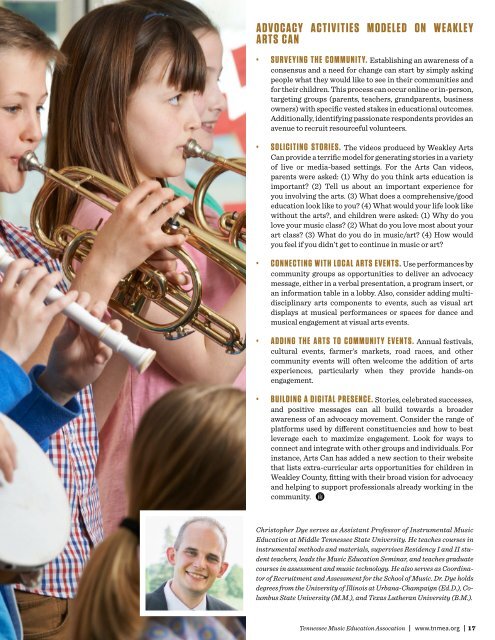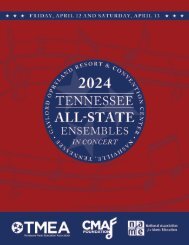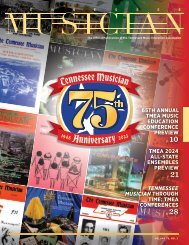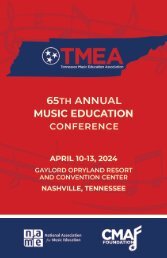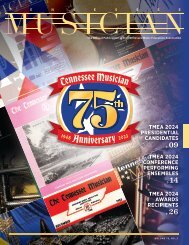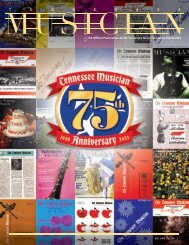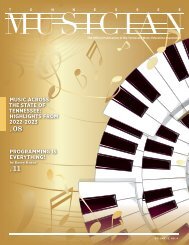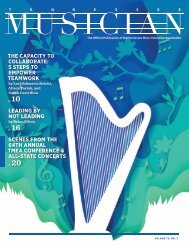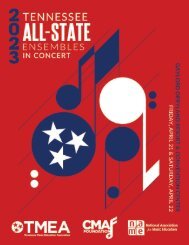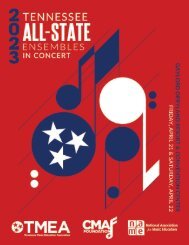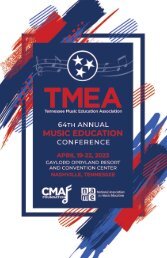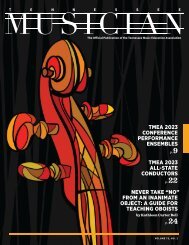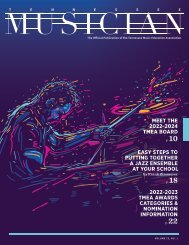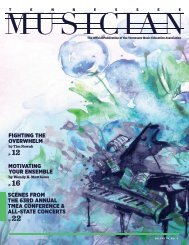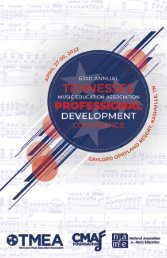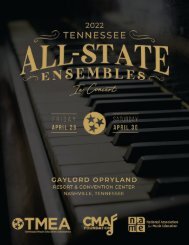Create successful ePaper yourself
Turn your PDF publications into a flip-book with our unique Google optimized e-Paper software.
ADVOCACY ACTIVITIES MODELED ON WEAKLEY<br />
ARTS CAN<br />
• SURVEYING THE COMMUNITY. Establishing an awareness of a<br />
consensus and a need for change can start by simply asking<br />
people what they would like to see in their communities and<br />
for their children. This process can occur online or in-person,<br />
targeting groups (parents, teachers, grandparents, business<br />
owners) with specific vested stakes in educational outcomes.<br />
Additionally, identifying passionate respondents provides an<br />
avenue to recruit resourceful volunteers.<br />
• SOLICITING STORIES. The videos produced by Weakley Arts<br />
Can provide a terrific model for generating stories in a variety<br />
of live or media-based settings. For the Arts Can videos,<br />
parents were asked: (1) Why do you think arts education is<br />
important? (2) Tell us about an important experience for<br />
you involving the arts. (3) What does a comprehensive/good<br />
education look like to you? (4) What would your life look like<br />
without the arts?, and children were asked: (1) Why do you<br />
love your music class? (2) What do you love most about your<br />
art class? (3) What do you do in music/art? (4) How would<br />
you feel if you didn’t get to continue in music or art?<br />
• CONNECTING WITH LOCAL ARTS EVENTS. Use performances by<br />
community groups as opportunities to deliver an advocacy<br />
message, either in a verbal presentation, a program insert, or<br />
an information table in a lobby. Also, consider adding multidisciplinary<br />
arts components to events, such as visual art<br />
displays at musical performances or spaces for dance and<br />
musical engagement at visual arts events.<br />
• ADDING THE ARTS TO COMMUNITY EVENTS. Annual festivals,<br />
cultural events, farmer’s markets, road races, and other<br />
community events will often welcome the addition of arts<br />
experiences, particularly when they provide hands-on<br />
engagement.<br />
• BUILDING A DIGITAL PRESENCE. Stories, celebrated successes,<br />
and positive messages can all build towards a broader<br />
awareness of an advocacy movement. Consider the range of<br />
platforms used by different constituencies and how to best<br />
leverage each to maximize engagement. Look for ways to<br />
connect and integrate with other groups and individuals. For<br />
instance, Arts Can has added a new section to their website<br />
that lists extra-curricular arts opportunities for children in<br />
Weakley County, fitting with their broad vision for advocacy<br />
and helping to support professionals already working in the<br />
community.<br />
Christopher Dye serves as Assistant Professor of Instrumental Music<br />
Education at Middle Tennessee State University. He teaches courses in<br />
instrumental methods and materials, supervises Residency I and II student<br />
teachers, leads the Music Education Seminar, and teaches graduate<br />
courses in assessment and music technology. He also serves as Coordinator<br />
of Recruitment and Assessment for the School of Music. Dr. Dye holds<br />
degrees from the University of Illinois at Urbana-Champaign (Ed.D.), Columbus<br />
State University (M.M.), and Texas Lutheran University (B.M.).<br />
Tennessee Music Education Assocation | www.tnmea.org | 17


